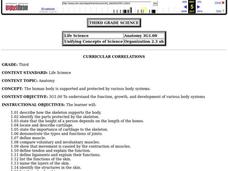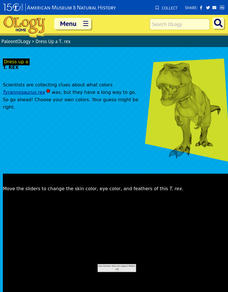Curated OER
TE Activity: Sound Line
Students investigate the decibel readings of various noises. They determine why high-level readings damage hearing. Students arrange sound from the lowest to highest decibel levels when they written on a piece of paper.
Curated OER
Maniac Magee: Picture Book Strategy
Who would have thought to explore the concept of race through children's literature? After reading Bell Hooks' picture book, Skin Again, and chapter sixteen of Jerry Spinelli's Maniac Magee, class members consider whether skin color...
Healthy Native Youth
Chapter 5: Learning About HIV/AIDS/STI's and Hepatitis Transmission
Middle schoolers delve deep into facts about HIV, AIDS, Hepatitis, and other STI's by way of discussion and a hands-on activity. Scholars ask and discuss questions anonymously using a Question Box. Two experiments showcase the...
American Museum of Natural History
Rubber Blubber Gloves
Using gloves, shortening, tape, and a lot of ice, participants experience the feeling of having blubber. The experiment's eight steps follow an informative page about blubber and animals that have it.
Curated OER
Pocumtucks in Deerfield
As part of a study of colonial and Native American history, class members focus on the beliefs and land use of the Pocumtucks, who settled near Deerfield, Massachusetts. Students examine their beliefs about land use and ownership, the...
American Museum of Natural History
Microbes Coloring Book and Scavenger Hunt
Coloring pages showcase microbes—bacteria, viruses, and protists. Scholars have the option to download a coloring book and scavenger hunt or color the page directly on the computer. Three paragraphs describe each microbe.
American Chemical Society
Entropy and Enthalpy Changes
My room isn't messy — it's a scientific experiment in entropy! Scholars investigate entropy, enthalpy, and spontaneity through a guided procedure and set of questions. The lesson connects the Second Law of Thermodynamics, energy transfer...
University of Colorado
Patterns and Fingerprints
Human fingerprint patterns are the result of layers of skin growing at different paces, thus causing the layers to pull on each other forming ridges. Here, groups of learners see how patterns and fingerprints assist scientists in a...
Curated OER
The Language of Medicine
For this health worksheet, students locate 50 terms related to the medical field. The words are hidden in a word search and include parts of the body, and various body systems.
Curated OER
Integumentary System
In this biology worksheet, students identify and locate various vocabulary terms pertaining to the skin. There are 41 biology terms located in the word search.
Curated OER
Skeletal System
Third graders describe and identify the parts of the skeleton and how they support the body. They observe two chicken bones that have been soaked in vinegar for 5 - 7 days. They observe the bone's appearance after it has been removed...
Curated OER
Anatomy of a Kick
Students investigate the muscle system operating in the kick of a ball. The order in which the six muscle groups contract is noted as the movement is produced by the contraction of opposing muscles required to move a limb in opposing...
Curated OER
Protection, Support, and Locomotion
In this human body activity, students will review 5 terms associated with the skin by filling in the blank. Then students will read 14 statements about the human skeleton and muscles and determine if its true or false.
Curated OER
Getting Under Your Skin
Students design advertisements that promote and explain the science of new transdermal drug therapies to the general public.
Curated OER
Fighting Infection
Students study immune responses and the structures that are related to immune cells functions. In this fighting infection instructional activity students construct antibody complexes and model the interaction of the immune system when...
Curated OER
Your Body's Defenses When Microbes Attack
Students study how being exposed to a harmful microbe doesn't automatically make them ill. They discover the lines of defense against microbe invaders and explore the roles of skin and mucus membranes, white blood cells, and lymphocytes...
American Museum of Natural History
Dress up a T. Rex
Scholars play with an image's color and brightness to predict how tyrannosaurus rex's skin, feathers, and eyes would have appeared. Information and real-world pictures shed light on what evidence guides our assumption of how a dinosaur...
Curated OER
AMPHIBIAN RESPIRATION
Learners describe the structural differences in the respiratory systems of aquatic and terrestrial vertebrates and explain the motivation for these structural adaptations in reference to the differences in habitat.
Curated OER
The Case of Regulation in Cells
After your biologists have learned about transcription, translation, and gene regulation, they work in a small group to create a poster of a system that serves as an analogy of the gene regulation process. They share their creations with...
Curated OER
Water Microbes and Human Health Exercise
In this water microbes and human health worksheet, students complete a crossword puzzle given 11 clues about different water born illnesses caused by microbes.
Curated OER
Shining the Light on Skin
Students investigate the relationships between certain environmental factors and levels of exposure to sunlight. The variables of location, time of year, and day, and the weather which affect the intensity of the sun are explored in this...
Curated OER
I, Me, Myself
Students create a big book self portrait of the human body. Inside, students illustrate pictures of the major organs, label, and paste them inside the big book.
Curated OER
Human Body Quiz
In this human body learning exercise, students complete short answer questions about the organs in the body and their functions. Students complete 20 questions.
Curated OER
Why Does My Body Smell?
Fourth graders investigate how germs spread among people. In this health instructional activity, 4th graders discover the causes of infection and proper hygiene methods.
Other popular searches
- Human Biology Skin
- Human Biology Skin Cell
- Human Biology Skin Aims
- Integumentary System (Skin)
- Integumentary System Skin
- Human Anatomy Skin

























